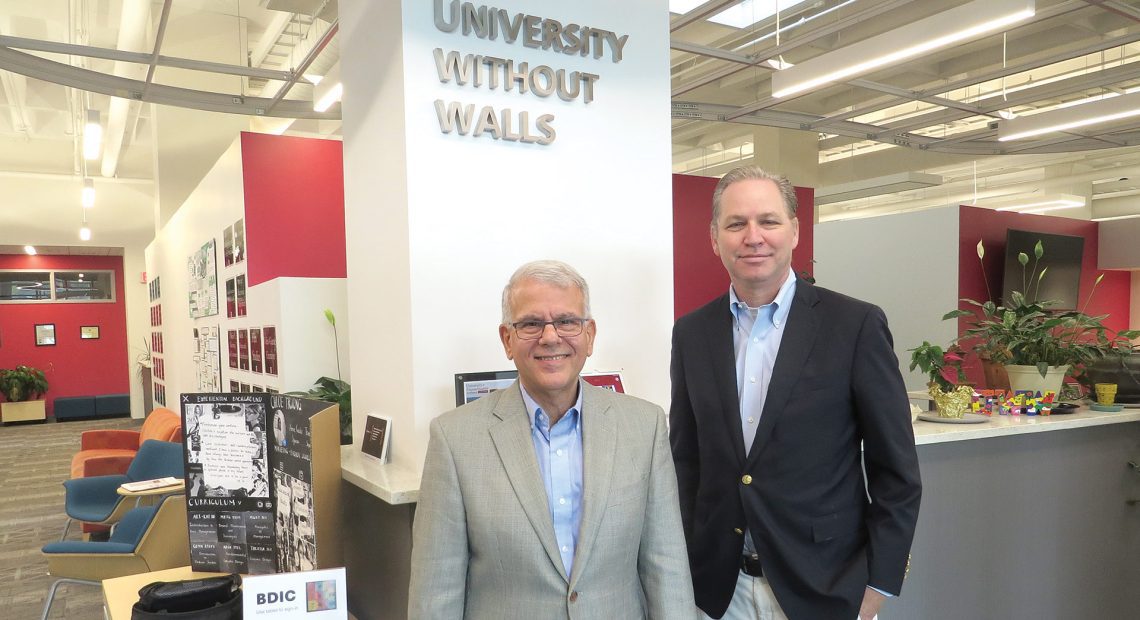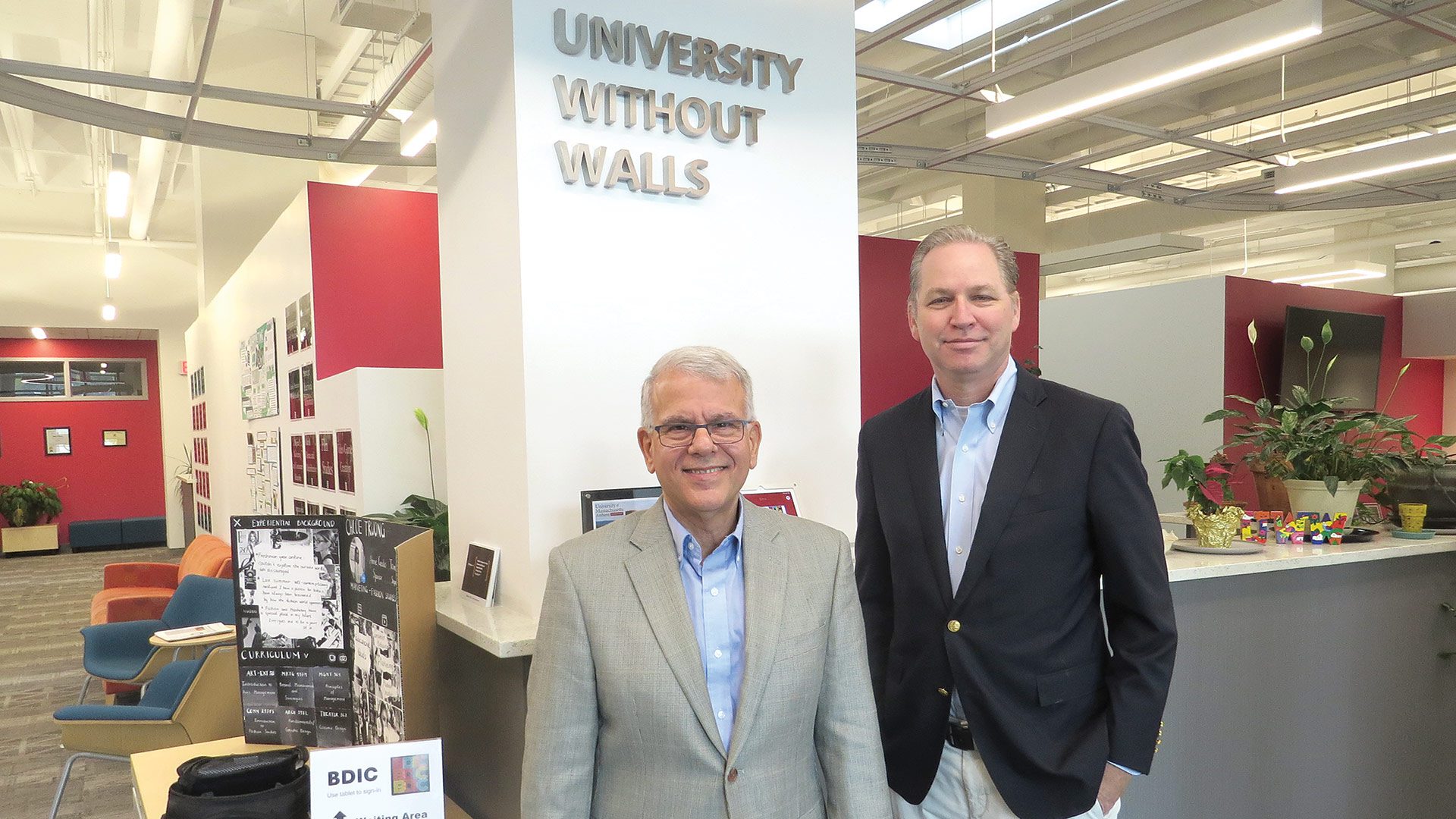
UWW Evolves as It Meets Needs of Non-traditional Students
Degrees of Progress

John Wells, left, and Joe Bartolomeo say UWW continues to expand and evolve while remaining true to a mission forged more than a half-century ago.
The University Without Walls program at UMass Amherst, or simply UWW, as it’s known to so many, last year marked its 50th anniversary of changing lives at a ceremony at the Old Chapel on the UMass campus.
And there was certainly much to celebrate.
Indeed, while the world of higher education, the world of work, and UWW, for that matter, have changed in profound ways since the early ’70s, the program’s basic mission, and reason for being, have not. It exists to help non-traditional students (and they come in many categories and with diverse needs) earn degrees, certificates, or even a few credits that can help them advance professionally and perhaps take their careers in a different direction.
As it has carried out that broad mission, UWW has been defined by two words that speak volumes about what it’s all about: accessibility and flexibility. And both are keys to those non-traditional students getting to where they want to go, said John Wells, senior vice provost for Lifeline Learning at UMass Amherst.
The accessibility comes in many forms, from the ease of entry into programs to the availability of courses online — in this case, decades before COVID made it standard operating procedure. The flexibility, meanwhile, also comes in different forms, but especially the ability to shape degrees to fit specific needs.
While the mission and some of the basic programs haven’t changed much since Richard Nixon was patrolling the White House, UWW has certainly evolved and expanded to meet the needs of non-traditional students, fill gaps, and go well beyond the degree-completion programs for which it is most known.
“Not only is it a non-traditional home, it’s also an innovative home for looking for new ways to educate. And that’s one thing that UWW is — it’s an incubator for change and innovation.”
“Instead of just adult degree-completion programs, UWW offers pre-college and professional programs,” said Wells. “We felt like we could provide a legitimate academic home for students who weren’t coming down that traditional pathway.
“And not only is it a non-traditional home, it’s also an innovative home for looking for new ways to educate,” he went on. “And that’s one thing that UWW is — it’s an incubator for change and innovation.”
Joe Bartolomeo, associate provost for Interdisciplinary Studies at UMass Amherst and also a professor of English, agreed.
He said UWW’s degree-completion offering, the Department of Interdisciplinary Studies, remains its flagship program. But it now also offers what’s known as a BDIC, or bachelor’s degree with individual concentration, which is for residential undergrads, he noted, “but residential undergrads who don’t want to follow a traditional major path — they want to create their own degree to best reflect their own interests and goals.”
There is also an IT program, a minor program that now boasts more than 500 students, as well as other IT-related initiatives, such as a computer-competency course and a public-interest technology certificate; an ‘interdisciplinary exploratory track’ for incoming UMass students who haven’t decided on a major or think they might want to pursue an interdisciplinary track; pre-college; professional development; summer programs; and more.
For this entry in BusinessWest’s ongoing series exploring professional-development programs at area colleges and universities, we take an in-depth look at UWW, its long history of excellence, and its ongoing tradition of expansion and evolution to meet the changing needs of students — and the region.
Grade Expectations
A snapshot of those in attendance at the 50th-anniversary celebration, delayed a year because of the pandemic, helps convey how this aptly named program has provided students at all stages of life with flexible learning opportunities and a chance to turn their work experience into credits toward a degree. Current and former mayors of area communities who attended UWW were on hand, as was Kate Hogan, speaker pro tempore of the Massachusetts House of Representatives, another alum, and business owners and managers from across the broad spectrum of the regional economy.
Tracing the history of UWW, Bartolomeo said it was created to help adults who had started college but not finished their degrees. At the heart of the program is the ability of students to take their work experience and convert it into college credits to be put toward a degree — in some cases, dozens of credits, thus expediting their degree-completion work.
At present, there are roughly 200 students in the BDIC program and another 500 in Interdisciplinary Studies, said Bartolomeo, adding that they are pursuing degrees, and minors, in many different areas.
“A lot of them work in education, many of them work in social work, a lot are in business and economics,” he noted. “But they can also create their own, and many of them come to us with considerable experience — they just didn’t finish their degrees.”
Wells agreed, noting that, while some have a specific major, or set of skills, in mind, others don’t, which is fine, because work is changing rapidly, and so are the job market and the skill sets needed to succeed in specific jobs and fields.
In UWW, he said, students are more free from the pressures of declaring a major and, in most respects, have more ability to fine-tune a degree to match their needs.
“In traditional education, there’s always that pressure, or emphasis, on declaring a major and figuring out what you’re studying,” he told BusinessWest. “We like to think of UWW as being a place where it’s OK to say, ‘I’m exploring a little bit more,’ or ‘I have a variety of interests.’
“Today, the world is moving fast enough where it’s hard to define education down to the letter,” he went on. “A lot of times, people are getting a degree, and by the time they’re done, the skills they’re acquired are out of date. We like to think of UWW as an incubator because we need to change our thinking about education, and this has always been a safe space to try things.”
While degree-completion offerings remain the heart of UWW, there are many different programs being offered, everything from summer offerings to graduate-degree programs to professional development.
In that last category, there are a number of non-credit and for-credit professional and continuing-education programs for those looking to gain new skills and knowledge in areas ranging from leadership to music; from writing to turf management.
“A lot of times, people are getting a degree, and by the time they’re done, the skills they’re acquired are out of date. We like to think of UWW as an incubator because we need to change our thinking about education, and this has always been a safe space to try things.”
Indeed, the UMass Winter School for Turf Managers, which was established in 1927 and was the first program of its kind, continues today, and is a top source for turf-industry professionals.
Meanwhile, as noted earlier, UWW has expanded into other realms beyond degree completion, including pre-college and summer programs, said Bartolomeo, adding that these are designed to help improve students’ chances of succeeding when they get to college.
There are several pre-college initiatives, including summer programs; ‘research intensives’ — six-week, immersive lab experiences alongside UMass Amherst research faculty; college-prep workshops, and even a week-long College Application Bootcamp.
Another related initiative is called Jump In, a summer program for newly admitted UMass students who want to get a jump on their college education, Wells noted, adding that they take a course online — a general-education course, an introductory major course, and/or a ‘student success’ course.
“It’s an opportunity for them to get a head start and see what a college course is like,” he explained, adding that more than 100 signed up for classes this past summer.
At the same time, and in keeping with that notion of UWW being an incubator, the university is using it to test-drive concepts and even proposed degree programs.
As an example, he cited a certificate program called Innovate, which, as that name suggests, is focused on innovation and entrepreneurship.
“Most of the professional schools are contributing courses to that, and it was originated by faculty in Engineering,” he explained. “But they didn’t want it to reside in one of the traditional STEM colleges because they wanted it to be open to students around campus. The provost’s office referred them our way, and we’re going to provide it with an academic home.”
Another example is called Commonwealth Collegiate Academy, a systemwide initiative for dual enrollment for high-school students, he said, explaining that this is different from pre-college and focuses specifically on public high schools that tend to be underresourced and have larger underrepresented, minority populations.
“It’s an opportunity for them to take courses live, online, during their school day,” Wells explained. “And we’re working now with various high schools on plans to start it next year; this is a priority of the president’s office, and even the governor’s office.”
Bottom Line
And it’s yet another example of how UWW continues to evolve and broaden the mission that it took on more than 50 years ago.
Those letters have become part of the academic landscape in Western Mass. — and well beyond. And, more importantly, they connote pathways (in the plural, because one size definitely does not fit all) to success in the workplace and in life.




